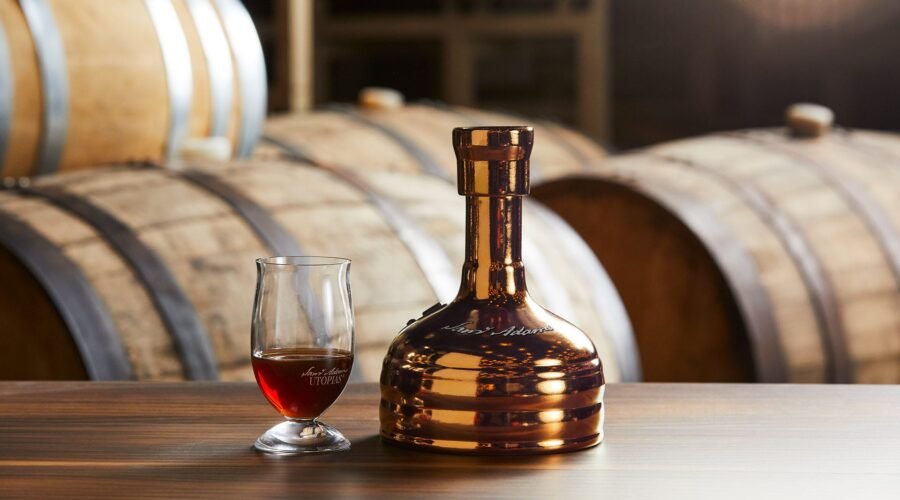Culture: Why This Cult Beer Is Illegal in 15 States
The Boston Beer Company’s Utopias, a strong ale blended and then aged in a variety of barrels, is the stuff of legend among beer drinkers. Many are willing to pay upwards of $240 for the 24.5-ounce, kettle-shaped ceramic bottle. Internet forums are filled with store sightings, offers for back-room trades and jokes about financing options.
Rarity breeds desire in the adult beverage space. Certainly, in the spheres of wine and spirits, collectors are known to hunt down limited-edition bottles to add to a cellar or save for special occasions. Beer, however, has largely stayed out of that fray. A beverage for the people, it’s often consumed fresh, and most recipes can be replicated. Utopias, which has been released every two years since 2001, is an exception to the rule.
Labor intensive to make and limited in supply (at least compared to the brewery’s flagship Samuel Adams Boston Lager) Utopias occupies exclusive real estate in the beer space. For the 2023 release, the brewery added new wording to the external packaging: “Illegal in 15 States.”
That printed nod to what some consider naughty or forbidden adds to the beer’s mystique, although it has been used in previous press campaigns by the brewery. Because of Utopias’ unique production methods—and far higher-than-average abv—it doesn’t fit into many states’ legal definition of “beer,” an issue that’s unlikely to change anytime soon.
You May Also Like: Does Your Favorite Beer Taste Different? The Brewer Might Have Changed the Recipe
Why Is It “Illegal”?
Why the beer cannot be sold in much of the country is not so much about the recipe, but rather post-Prohibition laws that remain on the books. It’s generally believed that Prohibition, which lasted in America from 1920 to 1933, was a spectacular failure. When it was repealed with the 21st Amendment, alcohol laws and rules were largely decentralized and left to the states. Some placed restrictions on how beer could be defined and how strong it could be.
“So that’s where a lot of this ‘illegal in 15 states comes from,’ because every state has its own little mini fiefdom over alcohol and how it can be manufactured, sold, advertised and more,” says Shauna Barnes, the founding Partner at Barnes Beverage Group, a Maryland-based law firm that services the alcohol industry.
“When these laws were written, almost 100 years ago in a lot of cases, they were based on what was made at the time,” she says. “So, beer is defined as something with water, malt, hops and yeast, and up to a certain alcohol-by-volume threshold. If a beer passes that, it’s either kicked out of the category completely or it’s kicked into the liquor category, even though it is not liquor.”
You May Also Like: Taxes, Tiers and Other Ways Prohibition Still Restricts U.S. Wine
The states where Utopias cannot be legally purchased are Alabama, Arkansas, Georgia, Idaho, Missouri, Mississippi, Montana, New Hampshire, North Carolina, Oklahoma, Oregon, South Carolina, Utah, Vermont and West Virginia. Many of them have placed a threshold of around 15% abv on beer. The 2023 Utopias weighs in at 28% abv.
“I think because it’s so far outside the scope of what beer is, it challenges what people usually expect,” says Shelley Smith, a senior brewing manager at Boston Beer. “Part of the fun is pushing boundaries and challenging what defines a beer. We’re also challenging ourselves on how to bring elements out and to stay on the cutting edge.”
What to Expect in the Most Recent Release
The 2023 version starts out as a traditional strong ale, with a grain bill of pale two-row, Munich and caramel malts and hopped with Spalt, Tettnanger and Hallertau. It’s then blended with previous versions of the beer and aged in whiskey casks. For this year’s release, it was aged in barrels that previously held bourbon, Scotch, ruby Port, Carcavelos, Cognac and Pineau des Charentes.
The flavor is unlike anything else in the beer space, with aromas of soy sauce and Tootsie Rolls, with vanilla, dried berries and earthy maple sweetness. The alcohol heat cannot be ignored or denied, and a one-ounce pour is often more than anyone needs. Taste it once, but remember it forever.
Other breweries that have created beers that do not conform to existing laws have also used the fact as a selling point in the past. California-based Anderson Valley Brewing Company is taking a similar advertising tack this year with the release of its Huge Arker Bourbon Barrel Imperial Stout, which has a more modest 15.5% abv, but is still unable to be sold in seven states.
Will the Laws Change Anytime Soon?
There have been advancements to beer laws across the country since the 1930s. Homebrewing was legalized in 1978. In the early 2000s, North Carolina launched its “pop the cap” initiative that updated laws to allow the sale of beers up to 15% abv, up from 6%. Mississippi has also slowly been updating its beer laws since the 1960s, when it formally repealed Prohibition.
More updates for allowing higher abv beers, like Utopias, could be in the offing in the states where it is currently banned. But for now, brewing guild officials in some of those states say there is a greater desire among brewers to focus on laws that allow direct-to-consumer (DTC) sales, or allow the United States Postal Service to deliver beer through the mail. Individual states have additional issues that brewers would like to see changed; clearing the path for nearly 30% beer is not high on many of their lists.
If changing the laws could “help with the commercial reality that these providers are going through right now,” then it would be a different story, Barnes says. In some states, if these products were “kicked into a liquor category—if we liberalized those DTC laws across all products, because wine has an advantage that spirits and beer do not—that could be an avenue to get a product like this into more hands, which I think would be pretty cool.”
What does this mean for the future? Utopias will likely retain its cult status and highly marketable, illicit allure for the foreseeable future.
You May Also Like: What Attendance at This Year’s Great American Beer Festival Says About the Beer Industry Right Now
Published: January 4, 2024


